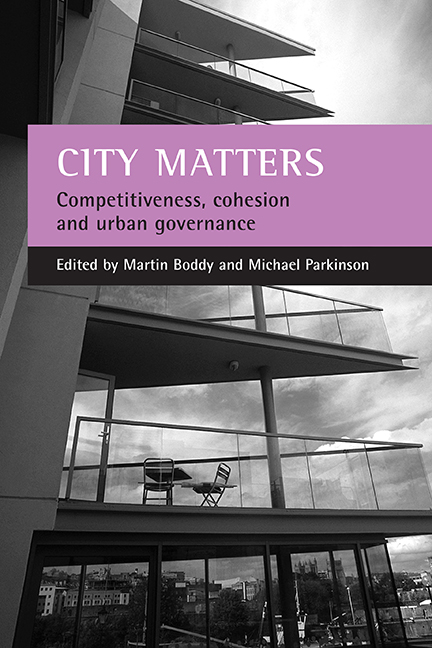Book contents
- Frontmatter
- Contents
- List of tables and figures
- Foreword
- Acknowledgements
- Notes on contributors
- one Introduction
- Part One Competitiveness, cohesion and urban governance
- Part Two Competitiveness and urban change
- Part Three Competitiveness, innovation and the knowledge economy
- Part Four Housing, property and economic performance
- Part Five Space, place and social cohesion
- Part Six Ethnicity, enterprise and social cohesion
- Part Seven Leadership, governance and social capital
- Conclusions
- Index
twenty two - Competitiveness, cohesion and urban governance
Published online by Cambridge University Press: 20 January 2022
- Frontmatter
- Contents
- List of tables and figures
- Foreword
- Acknowledgements
- Notes on contributors
- one Introduction
- Part One Competitiveness, cohesion and urban governance
- Part Two Competitiveness and urban change
- Part Three Competitiveness, innovation and the knowledge economy
- Part Four Housing, property and economic performance
- Part Five Space, place and social cohesion
- Part Six Ethnicity, enterprise and social cohesion
- Part Seven Leadership, governance and social capital
- Conclusions
- Index
Summary
This final chapter provides a summary of key findings from the research programme and explores policy implications. The first part of the chapter draws on the individual studies presented in this volume. The second part reflects on some of the wider issues relating to the main programme themes of competitiveness, cohesion and urban governance.
The four ‘integrated city studies’ that comprised Part One of this volume each covered a wide range of topics. Each also focused, from differing perspectives, on the core themes of competitiveness, cohesion and governance and on the relations between them. Key conclusions relating to these core themes are summarised here. Looking at the case study areas themselves, London is clearly distinctive given its sheer scale, complexity and its intensely internationalised economy. Bristol represents a free-standing city-region in prosperous southern England. The Scottish case study included direct comparison between Glasgow, with its history of severe decline, and more prosperous and increasingly buoyant Edinburgh. The final case study included comparative study of Liverpool, with, again, a history of severe economic problems, and Manchester, commonly perceived to have done better than its near neighbour – and to have done so in part through its own efforts.
Looking first at competitive advantage, a number of common messages emerge from the city case studies. Land, property and the planning system are clearly critical factors. In the case of London, it is argued that the region’s overall growth record has been constrained by lack of space and also planning constraints rather than any lack of demand. In both Edinburgh and Bristol, the availability of land and property have shaped and sustained competitive success in the past but now threaten to constrain continuing expansion. The balance between provision of employment growth and residential development and the overall effectiveness of strategic planning at a sub-regional scale are critical. Planning reform, as set out in the Planning and Compulsory Purchase Bill, 2002 (currently expected to come into force in June 2004), and new regional structures including in England Regional Spatial Strategies are likely to have important implications for the long-run competitiveness of urban areas.
In terms of ‘urban assets’ the city studies in general emphasise the importance of a relatively traditional set of urban agglomeration economies to competitive strength and the ability to attract investment.
- Type
- Chapter
- Information
- City MattersCompetitiveness, Cohesion and Urban Governance, pp. 407 - 432Publisher: Bristol University PressPrint publication year: 2004



